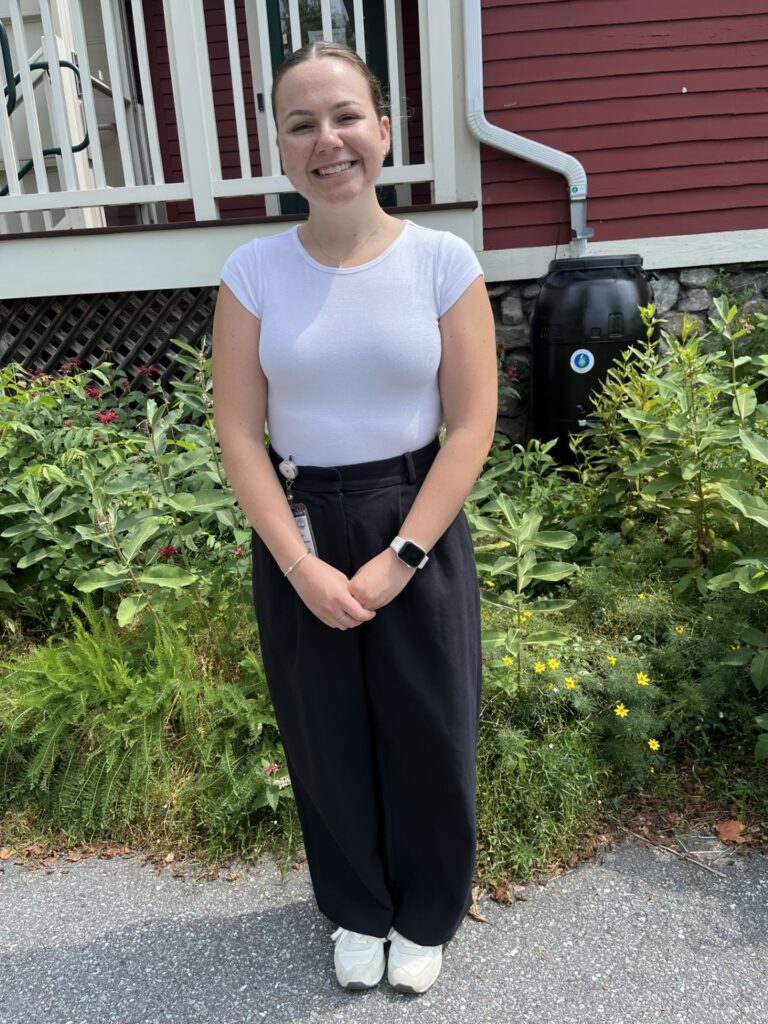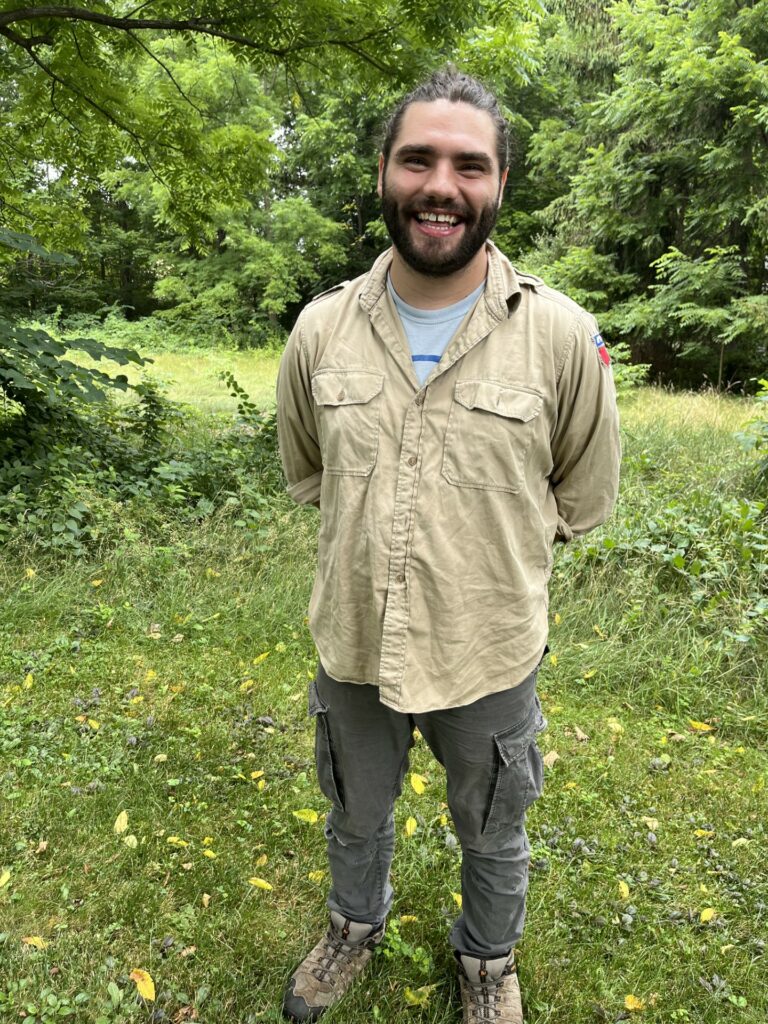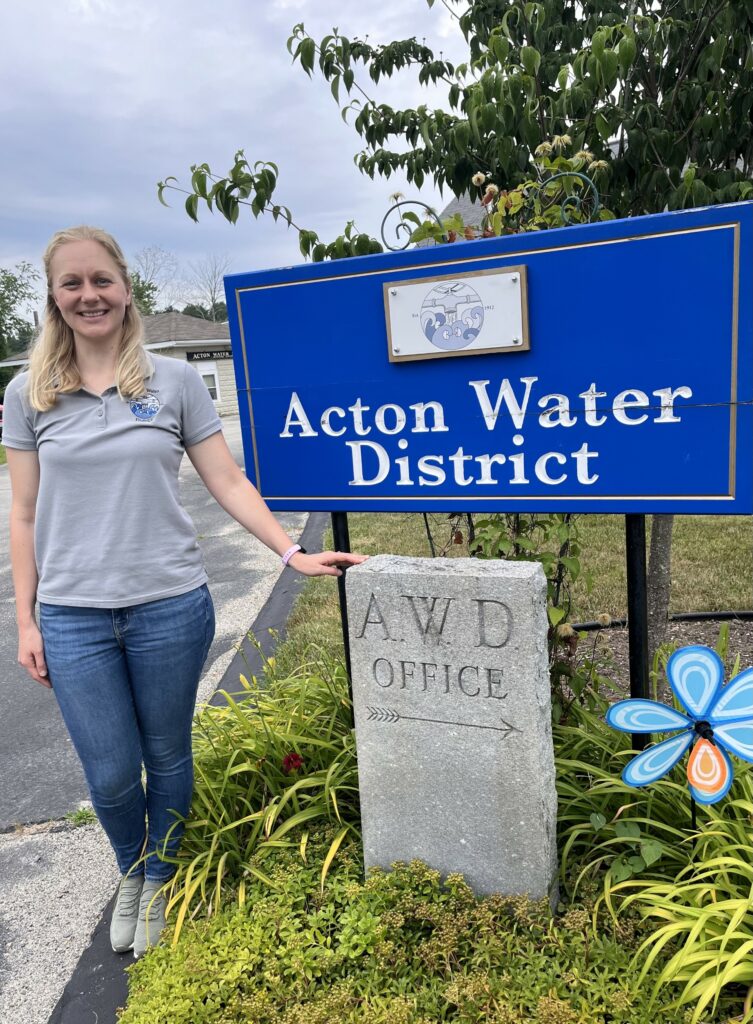Three young, energetic environmental professionals are working in local government to cut down Acton’s carbon emissions, protect our open spaces, and clean our drinking water: Lauren West, in the Town Sustainability Office; Ian Bergemann, in the Town’s Conservation Division; and Alex Wahlstrom, at the Acton Water District.
The current prolonged stretch of hot, muggy weather serves as a reminder of the global warming affecting us all. At a special Town Meeting in 2020, Acton voters overwhelmingly supported a Climate Emergency declaration and set a 2030 goal of net-zero emissions—counterbalancing greenhouse gasses that trap heat in the atmosphere. The climate resolution sparked the creation of the Sustainability Office in Acton.
“The goal of sustainability,” says Lauren West, environmental analyst in the Sustainability Office, “is to make sure we have enough resources for future generations to live comfortably. A big part of that is preparedness, mitigation, and adaptation. We need to acknowledge climate change is happening and prepare by having air conditioning and cooling centers ready. We need to work on reducing our fossil fuel and emissions, so we don’t have such extreme weather in the future. And we need to adapt to the fact that we will have it, and weatherize our homes by installing insulation and strengthening our windows.”

Lauren West found her passion for sustainability as a freshman at Bentley University when she joined Students for Sustainable Business, a group whose activities included visiting various farms and local businesses to learn about sustainability efforts in the community. During her senior year, she led the group as club president, interned for Bentley’s Sustainability Office, and researched climate action planning in Massachusetts. “I was completely hooked by the time I graduated!” she says.
After graduating in the spring of 2023 with a double major in Earth, Environment, and Global Sustainability, and Supply Chain Management, she applied to be a summer fellow in Acton’s Sustainability Office. “My research advisor had mentioned the Town’s many sustainability accomplishments, so I was very excited by the opportunity to work in a place that was so dedicated to climate action.”
In the fall, West joined the Sustainability Office, headed by Andrea Becerra and located in the Red House, as a full-time environmental analyst. Last year, she completed a greenhouse gas inventory to show the kinds of emissions the town is creating. She regularly reports on Acton’s energy use to Clean Communities, a coalition advocating clean transportation and energy.
Working with the Department of Public Works, she also gathers data and reports on Acton’s waste/composting and recycling programs. Tracking this information allows the town to measure its performance and qualify for Green Communities grants.
The free Clean Energy Coaching Program, sponsored by the Sustainability Office, offers residents and business owners the opportunity to learn about clean energy options. Trained volunteers provide information about weatherization and insulation, heat pumps for heat and air conditioning, solar energy, electricity sourcing, and electric vehicles. To date, coaches have helped more than 150 residents. “We’re here for support, but the coaches themselves take in requests and offer help,” says West.
The Sustainability Office also helps organize, support, and publicize events held by Energize Acton, a community action group. Recent events have included the Electric Vehicle Petting Zoo at the library and Celebration of Plant-Based Foods at NARA Park (postponed to July 24, 6-8 p.m.). On Tuesday, July 23, from 4:30 to 6:30, Energize Acton will host an Energy Magic Show, focused on energy challenges faced by renters and income-eligible families. While the children enjoy a magic show and games, adults will find out about energy efficiency and whether they’re eligible for discounts on gas and electric bills.
Currently, West is assisting in outreach efforts for two projects focused on our community’s vulnerability to various natural disasters and hazards. A mix of community members and staff from the departments of Sustainability, Public Works, Fire, DEI (Diversity, Equity and Inclusion), Planning, and Conservation are working to identify climate risks and resilience.
Ian Bergemann is another young environmentalist employed in the town’s Conservation Division and carrying on work of predecessors Tom Tidman and Bettina Abe. After interning with the US Fish and Wildlife Department on Outer Island off Connecticut’s coast, he dreamed of becoming a forest ranger, but soon realized the work was seasonal and didn’t pay well. So he was excited to hear that the Land Stewardship Coordinator position in the Conservation Division involved working outside in the town’s 2,100 acres of conservation lands and doing environmental education. “This,” he said, “is like a park ranger job!”

A native of Branford, Connecticut, Bergemann earned a bachelor’s degree in Environmental Systems and Sustainability and a master’s degree in Environmental Studies at Southern Connecticut State University. During his college years, he studied abroad in South Africa, Malaysia, and Iceland, and observed how diverse people view the environment. After receiving his M.S. in December 2022, he worked for SoundWaters, an organization dedicated to protecting Long Island Sound, before beginning his job as Acton’s Land Stewardship Coordinator in July 2023.
Working with the 23-member Land Stewardship Committee, Bergeman watches over conservation land trails, fights invasive species, organizes volunteers, and applies for grants to enhance the trails. He also works closely with the Friends of the Acton Arboretum and land steward Bettina Abe, and last year received a grant for $25,000 for park maintenance.
Bergemann is also involved with the Open Space Committee, which monitors lands in town that may be ecologically valuable, provide wildlife connectivity, or have potential as conservation land. In the updated 2024 to 2031 Open Space and Recreation Plan, he wrote the section on climate change.
In addition to land stewardship, environmental education is a key component of his work. During May—American Wetlands Month—he taught local fifth graders about these vital links between the land and water. He also hosted a wetlands trivia night at True West Brewery and helped children at the Infant Toddler Children’s Center learn about wetlands as well as restore a storm-damaged trail near their school.
On Senior Day at Acton-Boxborough High School, he and Lauren West, of the Sustainability Department, worked with students to clean up the gardens at the town’s Red House. “I was so happy with how enthusiastic people were to pull weeds!” he says.
In partnership with OARS, Bergemann is organizing a Water Chestnut Removal Day at Ice House Pond for Saturday, July 20, 9 am to 12 noon. Volunteers, ages 14 and up, with canoes or kayaks, are invited to take part. Some boats and life vests will also be available for use. Last September, forty-two volunteers removed an estimated 16,400 of these invasive aquatic plants.
Together with the Acton Conservation Trust, he revamped “I Hiked Acton Trails” into a challenge that awards a sticker and sew-on patch to those who walk (or wheelchair) all the trails in town.
In the future, he’ll be working with the Land Stewardship Committee on newly acquired town lands—38 Piper Road by Great Hill conservation land and 549 Main Street.
Alex Wahlstrom, the Acton Water District’s environmental compliance control manager, has also contributed to efforts to save our natural resources. “Before I went to school,” she says, “I knew I wanted to get into the environmental field. My father worked in trash and recycling for the city of Framingham. So growing up, I was always very environmentally conscious—turning off lights and shutting off the water.”

Wahlstrom graduated from Worcester State in 2011, majoring in Earth Science with a focus on Environmental Studies. A summer internship in the water quality lab of the Massachusetts Water Resources Authority set her on a career path focusing on drinking water. She worked in the Concord Water and Sewer Division for nearly a decade before joining Acton’s Water District in January 2022 to be chiefly in charge of water quality sampling and monitoring.
“There are now twenty-four wells located throughout the town that we monitor and do our best to manage, balancing human health and safety goals with environmental goals,” says Wahlstrom.
“Typically when people think about sustainability, they don’t necessarily think about water. But If you use less water, you’re also using less energy. It takes energy for us to treat the water and pump it to your house.”
Currently, all three of the operational facilities in Acton meet the Massachusetts standard for PFAS (Per- and Polyfluoroalkyl Substances) in drinking water, she says. Recent upgrades in the North Acton water treatment plant, which treats 20 percent of the town’s water, have resulted in nondetectable levels of PFAS. Upgrades are underway at the South and Central treatment plants, which should be operational by the fall of 2025. “We’re on track to be treating the water at all of our facilities for PFAS removal,” Wahlstrom says.
Acton Water District’s conservation guidelines have changed this year: From May 1 to September 30, nonessential water usage is restricted to two days per week, before 7 a.m. and after 7 p.m. “Nonessential usages,” Wahlstrom explains, “include lawn watering with an irrigation system or automatic sprinkler, washing vehicles, or power washing outside surfaces.” Watering days vary depending on where in Acton you live—Acton Center/East, North, South, or West.)
It’s okay to hand water plants or shrubs using a trigger-based hose.
Rain barrels can be another source of water for gardens. Wahlstorm encourages residents to use rain barrels, which are available each spring through the Water District’s discounted price program. Rain barrels, she says, have the added environmental benefit of intercepting rain runoff that can pick up pollutants and enter local water bodies.
Wahlstrom’s job also includes leading educational programs for students that focus on ways to protect our groundwater resources. “We typically do tours of the South Acton Water treatment plant,” says Wahlstrom. “We start at one of the wells on the property and describe the process from extraction to what happens to the water before it gets to a customer’s tap. We have a groundwater model that helps show what’s going on underground and how what we do on the surface impacts what we can’t see below us.”
After supporting the Acton Water District’s water quality, conservation, and outreach programs for the past two and a half years, Alex recently accepted a position with the Massachusetts Department of Environmental Protection’s central regional office in the Drinking Water Program.
All three government environmentalists have been helping the Red House, home of the Sustainability Office, go green. The Sustainability and Conservation departments as well as the Water District are collaborating to make the Red House property, located across the street from Town Hall, into an educational center, focusing on climate resiliency. A model will show residents how to plant and maintain native gardens in different microclimates — sun, rain, and shade.
A rain barrel has already been installed (watch on Acton TV) behind the house. Other water-related projects will include replacing old pipes and installing a rain garden.
For use by residents, the center will feature a small library with climate-related books and information, picnic tables, and raised garden beds. The Red House, which currently has gas and oil for heating for water and heating, will soon be made fully electric.
